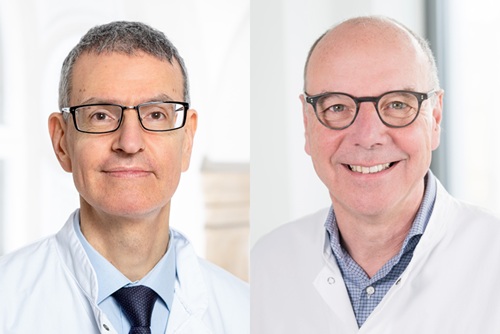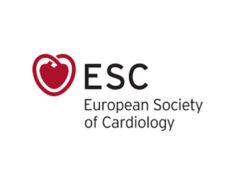
In a Cardiac Rhythm News guest article, chief investigators Nikolaos Dagres and Gerhard Hindricks (both Berlin, Germany) provide a window into the PROFID EHRA study—an international, investigator-initiated trial set up with the goal of redefining the prevention of sudden cardiac death (SCD) after myocardial infarction (MI).
Preventing SCD following MI remains a key challenge in cardiovascular medicine, as SCD is still one of the leading global causes of death and is estimated to account for around 20% of deaths in Europe. This field is the focus of the PROFID project, which is funded by the European Union’s (EU) Horizon 2020 research and innovation programme under grant agreement No. 847999.
Current prevention strategies of SCD in this setting primarily involve the implantation of a defibrillator, which can terminate life-threatening arrhythmias once they occur and thus prevent death. However, defibrillators do not address the underlying causes of SCD. Importantly, current recommendations for routine defibrillator implantation in patients with severely reduced heart function are based on old evidence generated 20–25 years ago and do not take into account the significant advances in the treatment of these patients, which have substantially reduced sudden death rates and may have thus decreased the potential benefit of the defibrillator.
Therefore, data on SCD prevention by defibrillator implantation after MI—under optimal contemporary management—are urgently needed. In order to adequately inform future guidelines, these data need to be provided by randomised evidence.
The PROFID EHRA trial (NCT05665608), which is a part of the PROFID project, aims to close this exact gap; it is an adequately powered randomised trial to reassess the potential benefit of implantable cardioverter-defibrillator (ICD) therapy in MI survivors with reduced left ventricular ejection fraction (LVEF) under contemporary medical treatment. In preparation for the PROFID EHRA trial, an extensive data analysis of more than 140,000 patients across 20 cohorts was performed, leading to the scientific basis for the trial. The results of that analysis were published in the European Heart Journal in October 2024.
The central aim of the PROFID EHRA trial is to assess the role of the defibrillator for primary prevention of SCD in MI survivors who receive contemporary optimal medical treatment. In brief, patients who have an LVEF ≤35% under optimal medical treatment after an MI are being randomised into optimal medical treatment plus defibrillator implantation versus optimal medical treatment without defibrillator implantation. A total of 3,595 patients will be randomised, and the trial’s primary endpoint is overall mortality.
Since its initiation in November 2023, PROFID EHRA has expanded to 10 European countries—Austria, Belgium, Czech Republic, Denmark, France, Germany, Hungary, The Netherlands, Poland and Spain—and further countries in Europe and Israel will follow. Currently, 53 study sites are initiated and many more are following at a fast pace in order to reach the goal of 180 participating study centres.
The trial has gained worldwide visibility, and the cardiology community is closely monitoring its progress. Particularly important is the strong support of the European Society of Cardiology (ESC), a consortium partner of PROFID, and of the European Hearth Rhythm Association (EHRA), which is expressed by the inclusion of the EHRA acronym in the trial’s name.
Results from the trial will have significant implications for patient care, society, and the sustainability of healthcare systems. Based on recent data, it is estimated that more than 50,000 defibrillators are currently implanted annually in the EU for this indication, with significant upfront costs. In addition, the devices require lifelong follow-up care, regular replacement due to battery depletion, and have a certain risk for immediate and long-term complications.
Overall, the ambition of the PROFID EHRA trial is to provide the evidence base for a contemporary strategy for primary prevention of SCD following MI, and to improve patient outcomes.
Nikolaos Dagres is an electrophysiologist at the German Heart Center of the Charité in Berlin, Germany. He has a special research focus on SCD and the conduction of randomised trials. He is/was international chief investigator of the PROFID EHRA trial, deputy chair of the steering committee of the RESET-CRT trial—a randomised comparison of different cardiac resynchronisation devices—and coordinating investigator of the PVI-SHAM-AF randomised trial comparing pulmonary vein isolation versus a sham procedure for atrial fibrillation (AF). He has had significant involvement as taskforce member, taskforce coordinator and review coordinator in different guidelines of the ESC, including the 2020 and 2024 AF guidelines, and 2022 SCD guidelines. He has served as board member of the EHRA in different positions—among others, as chair of the Scientific Documents Committee and of the Scientific Initiatives Committee. He also served for several years as deputy editor of the EP Europace journal.
Gerhard Hindricks is chief integration officer of the Deutsches Herzzentrum der Charité in Berlin, Germany, where he also leads electrophysiology and the Department of Cardiology, Angiology and Intensive Medicine at the Campus Charité Mitte. He is chief investigator of the PROFID EHRA clinical trial. Since 2005, he has been a professor of medicine in Germany. His particular scientific areas of interest are SCD, cardiac electrophysiology, cardiac device therapies, catheter ablation, ventricular tachycardia and AF. He served for several years—until the end of 2016—as deputy editor of the European Heart Journal and as a reviewer for numerous medical journals with high impact factors. From 2015 to 2017, he was the president of the EHRA. He has also served as member of the Committee for Practice Guidelines of the ESC, and is a member of the board of the ESC and chair of its Digital Health Committee. He was chief investigator of IN-TIME—an international randomised trial with defibrillator devices—and chief investigator of the large, publicly funded, multicentre RESET-CRT trial. From 2017 to 2022, he was editor-in-chief of EP Europace.









